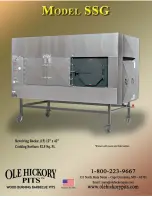
~
89
~
❖
Select a high-power level when you start cooking. Reduce the power level when
your food has been heated up.
❖
For long cooking times: Switch off the cooking zones 5 to 10 minutes before you
will finish cooking. This saves up to 20 % of energy.
❖
You can use the residual heat of the cooking zones for saving energy when
starting a new cooking procedure on a cooking zone which is still warm / hot.
❖
Do not open the oven door unnecessarily often.
❖
Switch off the oven in good time and make use of the residual heat.
❖
Only use the oven when cooking larger dishes.
❖
Meat of up to 1 kg can be cooked more economically in a pan on the hob.
❖
Make use of the residual heat of the oven.
❖
If the cooking time takes longer than 40 minutes, switch off the oven 10 minutes
before.
❖
For baking it is better to use black trays which conduct heat better and shorten
the baking time.
❖
Make sure the oven door is closed properly.
❖
Heat can escape through spillages on the door seals. Clean up any spillages
immediately.
❖
Do not install the oven / hob near of refrigerators / freezers. Otherwise, the
energy consumption increases unnecessarily.
6. Cooking guidelines
WARNING!
Be very careful when frying because oil and fat heat up
very fast especially when operating a high-power level. Extremely hot oil
and fat inflame spontaneously and represent a serious fire risk.
WARNING!
NEVER
try to extinguish a fire with water but switch off the
appliance and then cover flame e.g., with a lid or a fire blanket.
CAUTION!
The interior parts of the appliance become extremely hot.
Do not touch any parts inside the appliance if you handle your cookware.
RISK OF BURNS!
CAUTION!
Be careful if you open the door. Do not get in contact with
the hot parts of the oven or the steam, which will escape the oven. RISK
OF BURNS! RISK OF SCALDING!
CAUTION!
Cooking utensils may become hot because of the heat
transferred by the heated food. Potholders or oven gloves may be needed
to handle such utensils.
















































